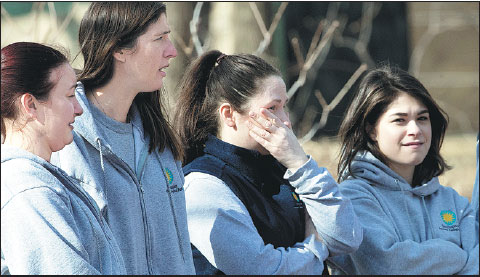Bao Bao says bye-bye to US, ni hao to China
By Chen Weihua and Zhao Huanxin in Washington, Huang Zhiling in Chengdu (China Daily) Updated: 2017-02-23 07:06For Dennis Kelly, director of the Smithsonian's National Zoo in Washington, DC, watching giant panda Bao Bao leave for China on Tuesday was "bittersweet".
Bao Bao, the zoo's 3-and-a-half-year-old female giant panda, left Washington Dulles International Airport for China on Tuesday afternoon aboard a FedEx Panda Express 777F airplane.
Accompanying her on her 16-hour trip were a keeper and a veterinarian, as well as bamboo, apples, "leaf eater" biscuits and cooked potatoes - all Bao Bao's favorite treats.
The 200-pound Bao Bao arrived at the China Conservation and Research Center for the Giant Panda in Chengdu on Wednesday night. She will be transferred to the nearby Dujiangyan Panda Base, where she is expected to stay in quarantine for about 30 days.
"(It is) very, very bittersweet for us today to see her go," Kelly said at the airport, shortly before Bao Bao's departure.
"That's how hard it is," Kelly said. "It's my hope, it's my dream that Bao Bao's offspring, her descendants, will be reintroduced back into the wild in China."
Under a bilateral agreement between National Zoo and China, panda cubs born at the zoo to pandas on loan from China belong to China and have to be moved to China before they reach the age of 4 to join the breeding program.
The National Zoo has held 10 days of online and on-site celebratory activities for people to say goodbye and send their best wishes to Bao Bao. Keepers and scientists at the zoo shared their knowledge and fond memories of giant pandas, in particular Bao Bao, whom they described as very independent.
"I think she will be fine. First class on the plane - Bao Bao definitely deserves it," Henry Miller of South Carolina said of the special flight on the custom-decaled plane.
"I've been to the panda house one time before, and it is just breathtaking," he said.
Miller and his wife came to the zoo to bid farewell to the panda a day before the scheduled departure. He said that given the very small number of this "wonderful natural treasure", the conservation efforts in China are noteworthy and laudable.
"If I have a chance to visit China, my first stop will be seeing Bao Bao's new home," Miller said.
After Bao Bao's departure, the National Zoo will still house three giant pandas - Mei Xiang and Tian Tian and their 18-month-old male cub, Bei Bei.
In Chengdu, the Dujiangyan Panda Base has prepared plenty of fresh bamboo for Bao Bao.
"It is not possible for the US plane that carries Bao Bao home to bring much bamboo with it.
In addition, US bamboo can enter the Chengdu airport only after the Sichuan Entry-Exit Inspection and Quarantine Bureau says it meets the quarantine requirements," said Zhang Guiquan, deputy chief of the China Conservation and Research Center for the Giant Panda.
Zhang and his colleagues were certain that Bao Bao will adapt to her new home at the Dujiangyan Panda Base near Mount Qingcheng, which is known for its lush forests and tranquillity.
"Pandas have a strong ability to adapt to a new environment, be it cold or hot," Zhang said.
Yuan Yuan contributed to this story.
Contact the writers at chenweihua@chinadailyusa.com
|
Animal keepers at the Smithsonian's National Zoo in Washington, DC, watch on Tuesday as Bao Bao, the zoo's 3-year-old panda, is loaded onto a truck to begin her trip to China to join a panda breeding program. She arrived in Chengdu on Wednesday night.J. Scott Applewhite / AP |
- 'Cooperation is complementary'
- Worldwide manhunt nets 50th fugitive
- China-Japan meet seeks cooperation
- Agency ensuring natural gas supply
- Global manhunt sees China catch its 50th fugitive
- Call for 'Red Boat Spirit' a noble goal, official says
- China 'open to world' of foreign talent
- Free trade studies agreed on as Li meets with Canadian PM Trudeau
- Emojis on austerity rules from top anti-graft authority go viral
- Xi: All aboard internet express












